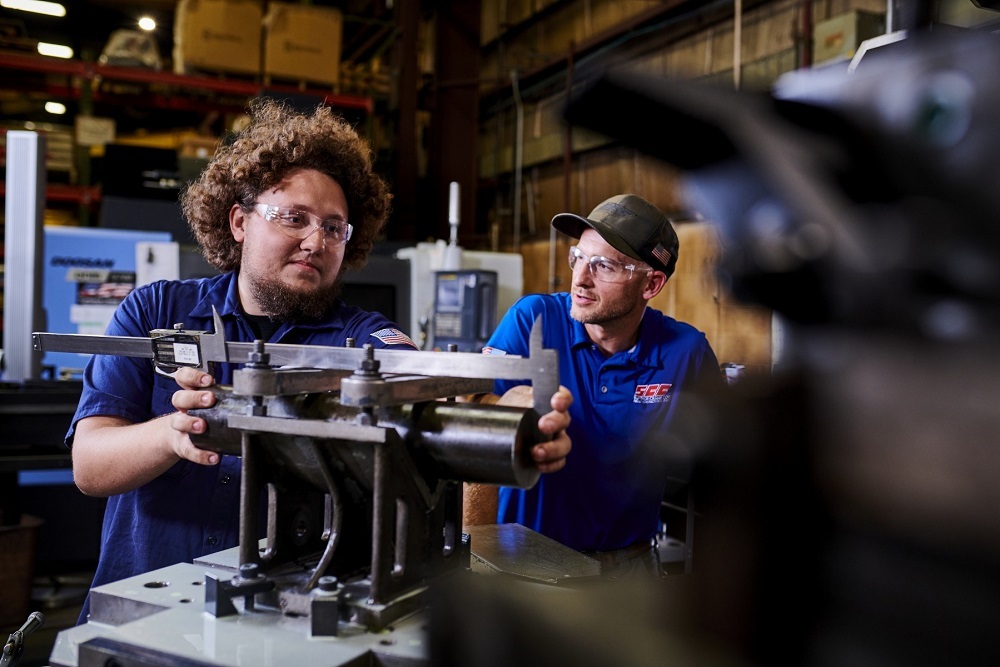Waukesha County Technical College issued the following announcement on November 2.
When Rich Barnhouse, Ph.D., began his role as president of Waukesha County Technical College in January, he made a promise to get out into the community to meet with local leaders of business and industry. Since then, he has visited more than 35 local manufacturers to check out their operations, learn more about the products they make and see how the College can better prepare students for jobs at their companies.
Exploring Local Business and Industry
The visits to various companies – such as Superior Crane Corp. (SCC), Eaton Corp., Miller Marriott Construction Co. LLC, MetalTek, Metal-Era, Quad Graphics, Inpro Corp., ITU AbsorbTech, Trace-A-Matic and EmbedTek, just to name a few – have provided Barnhouse with tremendous insight into the innovation happening locally.
"For most of the companies and industries I’ve been to, I was just amazed by how clean the facilities are, how skilled the labor is and how safe manufacturing has become," Barnhouse said. "I was impressed with how much Waukesha County, and industries in Waukesha County, are contributing not just nationally, but globally, to what life is going
to be like for decades."
Opening Doors, Creating Connections
In the spirit of reciprocity and growth, and with coordination from the Waukesha County Business Alliance, the College in spring welcomed dozens of manufacturing plant and operations managers, human resources professionals and others to campus to tour WCTC’s top-tier facilities.
Amanda Payne, senior vice president of public policy at the Alliance, was integral in setting up the tours and reconnecting businesses with the College – especially after the pandemic sidelined many events during the past year.
"There was incredible interest from our manufacturers in getting back on campus and seeing what’s new and what’s happening," she said, noting participants discovered more about new programs, customized training, dual enrollment options, internships, how to post job opportunities and more.
Some also made immediate connections, which ultimately benefited their workforce – as was the case for Chris Healy, chief inside operations officer, at SCC.
Chris Healy, along with his brother Ryan Healy, SCC’s chief outside operations officer, were both on a tour in April when Chris noticed student Erik Theissen meticulously working on a project in one of the labs. He asked Theissen if he had a job lined up, and when Theissen said he did not, Chris Healy encouraged Theissen to give him a call. The chance encounter worked out well for both.
"I started working (as a machinist) almost as soon as I finished school, in a full-time position, with the company," said Theissen, who graduated in May from the Tool
and Die program.
Coincidentally, in 2001, Chris Healy graduated from WCTC’s Tool and Die program. He was familiar with the courses Theissen was required to take and knew he had the skillset needed for a role at SCC. "His abilities have shown what he’s able to do, and a lot of that is from WCTC," Chris Healy said, noting the solid education Theissen received at the College.
The Healys are also exploring ways to involve WCTC with a new in-house training opportunity – SCC University – geared toward high school seniors. Students, through a referral and application process, participate in two months of classes at SCC during the summer after their junior year and focus on core values and life skills. Then, they work part time at SCC during their senior year and return for a second summer to focus on job-specific training – followed by a full-time job. The curriculum is SCC specific, but, says Ryan Healy, participants could benefit from a wider range of training opportunities available at the College.
"We’re looking to invest, and reinvest, in our people and ultimately grow for the future," Ryan Healy said. "We have immediate needs for people, but we’re trying to build relationships for the long haul through local high schools, the technical college, the business alliance and other ways."
Strengthening Relationships Within Business and Industry
Mike Shiels, WCTC’s School of Applied Technologies dean, said education and industry are reliant on one another and need to continue to work in tandem to drive economic success within the region.
"It’s absolutely critical to maintain relationships with local manufacturers – for so many reasons," Shiels said, among them the importance of aligning the curriculum with industry practices and the value of connections for placing students in internships and jobs. Additionally, Shiels said, employer input is also important when selecting tools and machines for the classroom, so students are trained on the proper equipment and are ready for the workforce.
Eaton Corp., a multinational power management company with its power systems division headquartered in Waukesha, has partnered with WCTC for many years, and in many different capacities. This includes relationship building with College educators, philanthropic support and customized training through the Corporate Training Center, said Jackie Pride, Eaton’s communications and engagement manager. Just last month, a group of WCTC students and their instructor visited the company to learn and observe welding techniques used on the shop floor.
"We regularly meet with WCTC instructors and leaders to share ideas and best practices. That is the foundational part to this industry-education partnership," Pride said. "That must be continuous and ongoing, because skills are continually changing and industry needs are continually changing. If you stop talking to one another and stop sharing ideas, it’s going to become static
and irrelevant."
The Need for Workers
WCTC, the Alliance and local businesses are discussing ways, together, to develop a well-prepared talent pipeline. Barnhouse said in his interactions with manufacturers – smaller, family-owned companies like SCC that could immediately hire 10 people, or larger companies like Eaton that could hire around 100 people – the need is the same: employers need workers.
"We often hear about an employee shortage, but I was shocked at how large a dearth there is right now. Most of the people I’ve spoken with, depending on the company, are ready to hire 10 to 40 people right now. And these are positions that are paying $20 to $35 an hour, with great benefits and the ability to grow within these companies," Barnhouse said. "In addition to WCTC delivering more skilled workers, we need to share – with business and industry, and by working together with the Alliance – how technically skilled modern manufacturing is, what quality of life people achieve and the ability for growth. That’s part of our responsibility."
FROM WCTC IMPACT, FALL 2021 EDITION
Original source can be found here.



 Alerts Sign-up
Alerts Sign-up